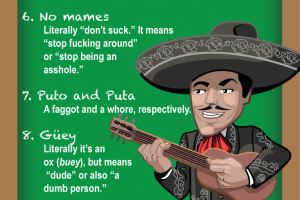Common Mexican gestures shared by natives Spanish speakers from Guadalajara. Includes a full video and 6 images.
INFOGRAPHIC: 10 Best Mexican Spanish Swear Words and Insults
A list of Mexican Spanish swear words and phrases with English translations. Learn how Mexicans curse and share the infographic.
FREE List of 75 Mexican Spanish Phrases and Expressions
Get a compilation of 75 common Mexican Spanish slang phrases and expressions. It provides definitions and explanations for each expression, offering insights into the colorful and dynamic language used in Mexico.
ya chingué
A Mexican slang phrase generally used to express success or accomplishment. It roughly translates to 'I already nailed it' or 'I already won'. Examples Spanish: Ya chingué, por fin logré mi objetivo. English: I've nailed it, I finally achieved my goal.
te chingué
A Mexican slang phrase that is used to express that you defeated or bested someone in a challenge or competition. It comes from the verb 'chingar' which has various meanings depending on the context, but in this case, it's used to imply winning or beating someone. Examples Spanish: ¡Te chingué en el juego de ajedrez! […]
soy la pura verdura
A colloquial phrase from Mexico, 'soy la pura verdura' is used to express the idea of being good, healthy, or innocent. It can be used to refer to oneself or others, and it roughly translates to 'I am pure health' or 'I am pure innocence'. Examples Spanish: 'No te preocupes por mí, mamá, soy la […]
ser muy X
The phrase 'ser muy X' is a versatile slang term where 'X' can be replaced with any adjective. It is used to express that someone embodies a specific characteristic or trait to a high degree. Examples Spanish: Ella es muy trabajadora, nunca la veo descansar. English: She is very hardworking, I never see her rest.
quedarse de a solapas
A Spanish slang term primarily used in Mexico, 'quedarse de a solapas' means to be left surprised or astonished. It can also refer to being left waiting or hanging. Examples Spanish: Cuando le dijeron que había ganado la lotería, se quedó de a solapas. English: When they told him he had won the lottery, he […]
poner los cachos
A colloquial phrase used in various Latin American countries, particularly in Colombia and Venezuela, that means to cheat on someone or to be unfaithful in a relationship. Examples Spanish: Juan sospecha que su novia le está poniendo los cachos. English: Juan suspects that his girlfriend is cheating on him.
pa’ mearlo
A Spanish slang expression used to describe something or someone that is very funny or outrageous, literally translating to 'to pee him'. It is mostly used in Spain. Examples Spanish: El show de ese comediante es pa’ mearlo, me hizo reír mucho. English: That comedian's show is 'pa’ mearlo', it made me laugh a lot.
no te calientes, plancha
A colloquial phrase meaning 'don't get heated, iron.' It's used to suggest someone should calm down or not take things too seriously. Examples Spanish: No te calientes, plancha, no es para tanto. English: Don't get heated, iron, it's not a big deal.
mover la chancla
A phrase that literally translates to 'move the flip flop', but is commonly used to imply disciplining someone or threatening to do so, particularly when a parent is warning their children to behave. Examples Spanish: Si no dejas de hacer ruido, voy a mover la chancla. English: If you don't stop making noise, I'm going […]
me late
A Mexican slang phrase which translates to 'I think' or 'it sounds good to me'. It's often used to express agreement or enthusiasm about an idea or plan. Examples Spanish: ¿Quieres ir al cine esta noche? Me late. English: Do you want to go to the cinema tonight? Sounds good to me.
mal cabreado
Extremely angry or pissed off Examples Spanish: Mi padre estaba mal cabreado cuando descubrió que había suspendido el examen. English: My father was extremely angry when he found out that I had failed the exam.
loco de remate
It is a Spanish slang phrase used to describe someone who is extremely or utterly crazy. Examples Spanish: No puedes saltar desde esa altura, ¡estás loco de remate! English: You can't jump from that height, you're utterly crazy!
lo chingaron
A vulgar slang term that basically means 'they screwed him over' or 'they messed him up'. It is often used to describe a situation where someone has been treated unfairly or beaten in some way. Examples Spanish: Perdió todo su dinero en el casino, lo chingaron bien y bonito. English: He lost all his money […]
La Merced
La Merced is not a slang term, but a name commonly used to refer to a large traditional market located in Mexico City. In a slang context, it could potentially be used to refer to any busy, chaotic place. Examples Spanish: Voy a ir a La Merced a comprar frutas y verduras frescas. English: I'm […]
irse a la chingada
A Mexican slang phrase often used to tell someone to go away or to express the idea of getting out of a place, situation, or relationship. It can be roughly translated as 'go to hell' or 'go screw yourself'. It's considered vulgar and should be used judiciously. Examples Spanish: Si no te gusta lo que […]
hablar con la neta
To speak the truth, to be honest, or to speak frankly. Examples Spanish: Necesito que hables con la neta, ¿realmente te gusta mi comida? English: I need you to speak the truth, do you really like my food?
hacer de chivo los tamales
This Spanish slang term is mostly used in Mexico and it means to be the scapegoat, or to take the blame for something you didn't do. Examples Spanish: No es justo que siempre hago de chivo los tamales en esta situación. English: It's not fair that I always take the blame in this situation.
hacerse la jarocha
A Mexican slang meaning to ignore or pretend not to hear something. It is used when someone deliberately doesn't pay attention or ignores something they don't want to deal with. Examples Spanish: Mi hermano siempre se hace la jarocha cuando le pido que me ayude con los deberes. English: My brother always ignores me when […]
güeba or güeva
In Mexican slang, 'güeba' or 'güeva' is a vulgar term often used to refer to a person's laziness or lack of motivation. It can also refer to a man's genitals. Examples Spanish: No quiero hacer nada, tengo una güeva. English: I don't want to do anything, I'm feeling so lazy.
estar del culo
A Spanish slang term often used to express being in a bad situation, feeling bad, or being extremely tired. It has a negative connotation. Examples Spanish: Después de trabajar todo el día, estoy del culo. English: After working all day, I'm worn out.
estar cajeta
A phrase commonly used in Mexico to refer to being extremely tired or worn out. It can also be used to describe being in a difficult or complicated situation. Examples Spanish: Después de trabajar todo el día, estoy cajeta. English: After working all day, I am extremely tired.
estar comiendo camote
A colloquial phrase used in Mexico which literally means 'to be eating sweet potato'. It is used to refer to someone who is in a complicated or difficult situation, or who is going through a hard time. Examples Spanish: Juan ha estado comiendo camote desde que perdió su trabajo. English: Juan has been eating sweet […]
en chifla
A term used in Peru meaning being in a bad situation or in trouble. Examples Spanish: Estoy en chifla, perdí todo mi dinero en el casino. English: I'm in trouble, I lost all my money at the casino.
echar porras
To cheer on or encourage someone. Examples Spanish: Vamos a echar porras para nuestro equipo en el partido de esta noche. English: We are going to cheer for our team in tonight's match.
echar una cacatúa
The phrase 'echar una cacatúa' is not recognized as a common or popular slang term in Spanish. It may be a regional or very specific slang term, if it is used at all. 'Cacatúa' is Spanish for 'cockatoo', a type of bird, and 'echar' can mean 'to throw' or 'to send', among other things. However, […]
echar la concha
A colloquial phrase from Argentina, which can be rude and offensive. It's used to express frustration, annoyance, or lack of interest. Literally translates to 'throw the shell', but its meaning is more akin to 'not caring at all' or 'not giving a damn'. Examples Spanish: Estoy tan harto de este trabajo, estoy a punto de […]
de a grapa
A Spanish phrase that means 'for free' or 'without cost'. It's a colloquial way to refer to something that is given or received without any charge. Examples Spanish: El concierto fue de a grapa, no tuvimos que pagar entrada. English: The concert was free, we didn't have to pay for entry.


